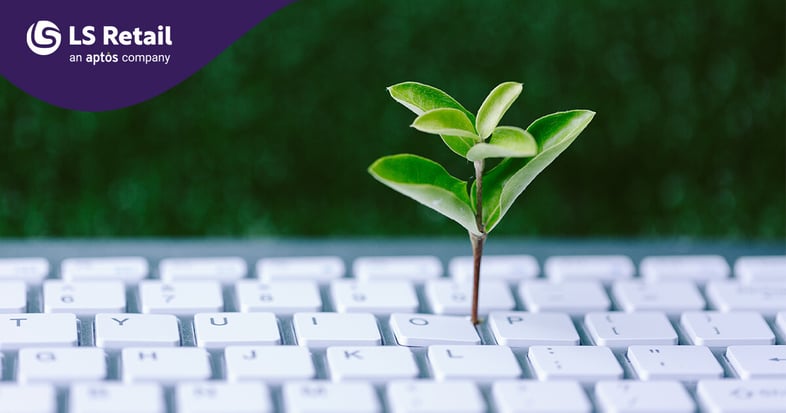How Microsoft Dynamics Business Central helps retailers be more sustainable

Contributing to more than 25% of global greenhouse gas emissions, retailers face growing calls to step up their sustainability strategies if they are to reach a net zero target by 2040. Regardless of their size, grocery stores, furniture shops, e-commerce businesses, clothing brands, and department stores must all find ways of decreasing waste, reducing carbon emissions and lowering energy usage across the board to thrive in an increasingly eco-conscious world.
How can Business Central help retailers be more sustainable?
Microsoft is constantly adding new features to Microsoft Dynamics 365 Business Central to help retailers become more efficient and sustainable. In one of its latest releases, Microsoft introduced sustainability reporting capabilities so that retailers can better understand their carbon footprint and accurately track and measure carbon emissions across the supply chain. This is particularly important as industry regulations, such as the European Union’s Corporate Sustainability Reporting Directive (CSRD) and other ESG standards, crack down on sustainability reporting and require a growing number of businesses to be more transparent about their environmental and social impact.
When you use LS Central unified business management software, which is built on Microsoft Dynamics 365 Business Central ERP, you can easily take advantage of all the functionality available in Business Central to help your retail business become more sustainable. Here are some of the ways Business Central can help retailers using LS Central achieve their sustainability goals.
1. Reduce waste
Retailers can eliminate waste by connecting information across their business and identifying ways to make best use of resources. Currently, a reported 87% of food waste from grocery stores comes from produce expiring before it can be sold at the right time. Business Central offers advanced supply chain management tools to prevent this from happening. And the functionality available in LS Central makes it easier for businesses like supermarkets and food retailers to manage perishable items so they can sell products with shorter shelf lives before it’s too late.
Here are a variety of other ways that Business Central and LS Central can help retailers reduce waste:
- Create production schedules to avoid surplus stock and make the best use of precious resources
- Expiration date tracking tools allows food retailers to standardize labeling and demystify any confusion with sell by dates
- Dynamic pricing means grocery stores can run discounts on items that are nearing expiration to avoid lost sales
- Robust business intelligence software allows retailers to track waste and make informed decisions based on analytics and data
- Track all waste from food, plastics and packaging to identify usage patterns and measure the company’s carbon footprint
- Avoid generating waste from over producing and over stocking goods with Business Central’s AI-powered forecasting tools and supply chain management.
2. Lower energy use and carbon emissions
Whether retailers run a physical store, an eCommerce site, or a mix of the two with fulfillment centers and warehouses, they need to be able to track every facet of their business and see where they can decrease energy usage and carbon emissions across all areas of fulfillment.
LS Central helps businesses ensure that all stock is accurately located and tracked, offering efficient replenishment and real-time information on inventory levels. With a clear overview of where everything is and where stock is needed across all stores, businesses can get a better understanding of how to optimally distribute their inventory and improve efficiencies.
Using Microsoft Business Central’s Chart of Sustainability Accounts framework, companies can also categorize and sort a range of emissions data including carbon emissions and waste, and track where it has been generated from. Sustainability Journals also allow users to manually enter emissions data or make use of in-built formulas to make accurate calculations.
3. Support sustainable consumption habits
Consumers increasingly want to shop with sustainable and ethical retailers, and a large proportion (almost three quarters of consumers globally) are willing to change their consumption habits to reduce their environmental impact. This includes reselling pre-used items, buying refurbished goods and seeking out products made from recycled materials.
Business Central enables retailers to support new consumer habits and deliver a truly sustainable shopping experience by allowing them to:
- Make informed and sustainable choices with clear product labeling and information
- Deliver circular economy business models
- Track materials, size and weight of packaging to reduce emissions and avoid unnecessary waste
- Promote fairtrade and ethical social practices across the value chain
- Be more transparent about their sustainability activities and support comprehensive Environmental, Social, Governance (ESG) reporting
- Use AI-based tools to analyze the supply chain, identify ways of optimizing resources and energy, and support smart decision-making.
4. Be part of the circular economy
As the circular economy and progressive sustainable behaviors gain traction, the retail sector can play its part by developing more circular business models, marketing second-hand goods, extending the lifespan of products and refurbishing materials into new products.
IKEA hosts its secondhand furniture site Buyback and Resell where consumers can sell their used furniture back to the retailer for in-store credit. Luxury retailer Selfridges also has its own resale platform Reselfridges, which sells pre-loved designer pieces as part of its sustainability initiative Project Earth. Other leading retailers are behind similar online pre-loved platforms to keep apparel out of landfill, all of which can be integrated and managed within LS Central.
5. Improve transparency
The European Union’s Corporate Sustainability Reporting Directive (CSRD) and other related industry regulations put the responsibility on retailers to be more transparent about the sustainability measures they’re taking, and how, and the true impact they’re having.
Business Central’s emissions tracking features help retailers comply with these standards by collecting all the data they need and delivering the right reports. Using this solution, retailers can:
- Record and report key sustainability information
- Monitor and report on both qualitative and quantitative activities
- Provide forward-looking and retrospective insights
- Use this information to actively reduce emissions.

